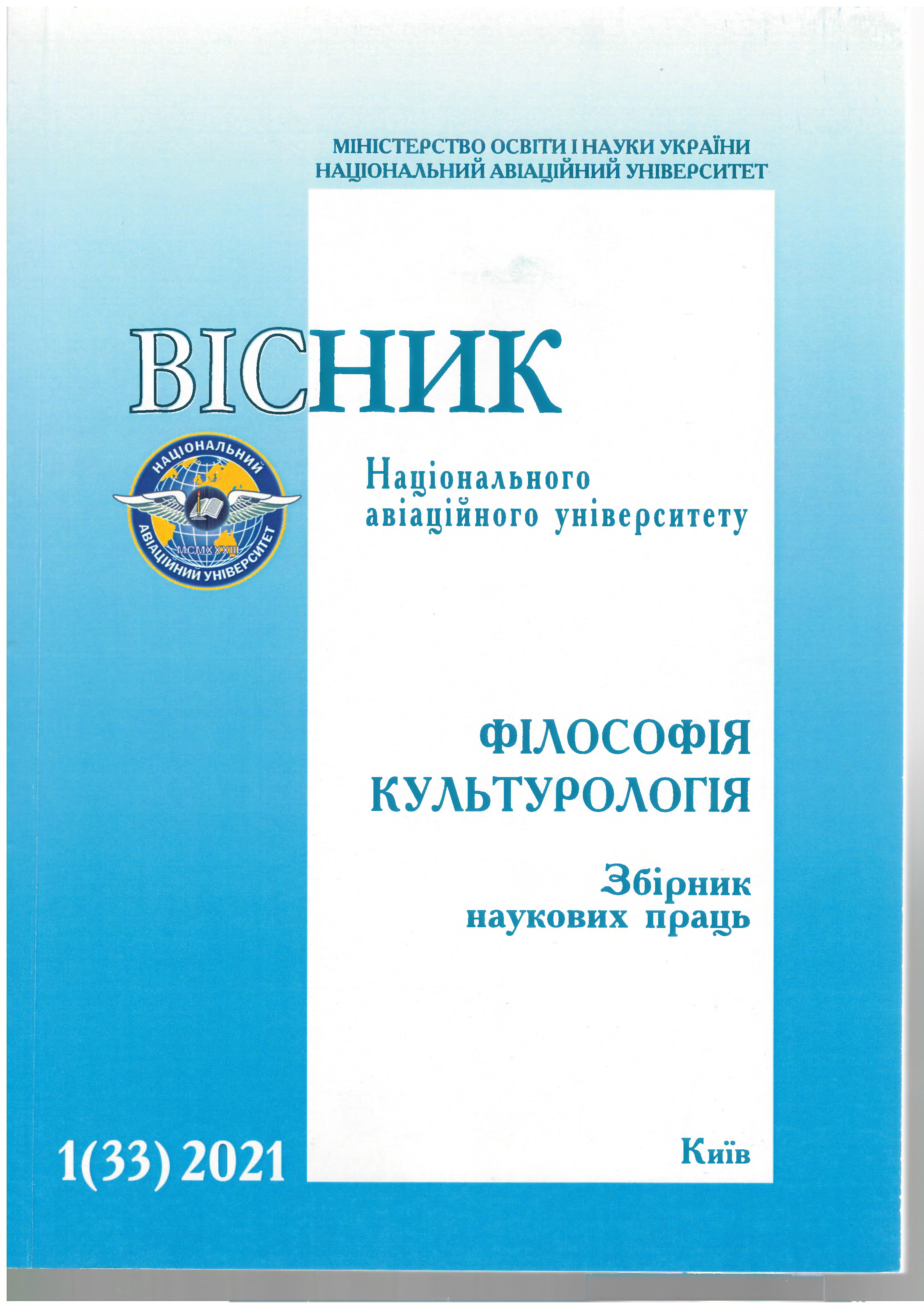SOCIO-CULTURAL CHALLENGES OF MISINFORMATION
DOI:
https://doi.org/10.18372/2412-2157.33.15664Keywords:
misinformation, infodemic, conspiracy theory, conspiracism, conspiratorial worldview, cognitive biases, epistemic biases, epistemic errors, epistemic vicesAbstract
information and false knowledge, which has huge dissemination in society and causes permanent multifaceted challenges. In this paper, misinformation is understood as types of information that lead to a misperception of the actual state of things in the world. The essence of misinformation as untruth, false knowledge is analyzed on the example of the phenomenon of "conspiracy theory". Research methods. The research methods used in the paper are analytical, system-logical, dialectical, and synthetic. As interdisciplinary approach synthesizes the achievements of the socio-philosophical direction of such fields as psychology, sociology, epistemology, ethics, and culture studies, its application determines the need for research the essential characteristics of "conspiracy theory" as a kind of misinformation. The aim and tasks. This article aims to analyze the scientific approaches concerning the essence of the phenomenon of misinformation, particularly, "conspiracy theory" as its variety, as well as to establish socio-cultural assessments of challenges and potential consequences of information boom, which is likely to contain false information. In the context of this goal, the main tasks of this paper are to introduce the general and individual approaches concerning the analysis of the misinformation phenomenon, define the concepts "conspiracy theory", "conspiracism" and "conspiratorial worldview", as well as reveal problematic aspects of cognitive, epistemic, and ethical measurements of "conspiracy theory". Research results. It is claimed that in the socio-cultural aspect, there is a general manipulation of public consciousness, in which misinformation is used as an ideological tool for speculative political purposes, that is accompanied by populism and propaganda. At the individual level, the situation is problematized due to internal effects or attitudes of thinking, substantiated by the cognitive sciences as intellectual cognitive biases. The main biases are the lack of meta-knowledge, confirmation, and confabulation, which provoke such challenges
as devaluation and rejection of professional expert and scientific knowledge, and as a result the establishment of ignorance and narcissism cult. Discussion. "Conspiracy theory" as a misinformation phenomenon is based on the world-view conspiracy. It is an example of communicative problems that influence the political and socio-economic situation in society. "Conspiracy theory" is understood as one of the epistemic errors that arise due to dissatisfaction with the basic epistemic needs - understanding and cognitive interest. Epistemic distortions, errors, vices, and biases are a complex cognitive problem that reveals a defective way of thinking and inappropriate, including indifferent, attitude to knowledge. Conclusion. The social and individual levels of the phenomenon of disinformation are based on moral and epistemological contexts.In general, the socio-cultural situation is defined as a communicative crisis: a crisis of trust and understanding, loss of dialogue.
References
Abbasi K. When good science is suppressed by the medical-political complex, people die. Covid-19: politicisation, “corruption,” and suppression of science BMJ 2020; 371 doi: https://doi.org/10.1136/bmj.m4425 (Published 13 November 2020) URL: https://www.bmj.com/content/371/bmj.m4425 2. Bortolotti L ., Murphy-Hollies K. An exceptionally British hypocrisy. The truth behind appeals to the great British character. Issue 93, 4th December 2020 IAI: [сайт] URL: https://iai.tv/articles/an-exceptionally-british-hypocrisy-auid-1707 3. Cassam Q. Vices of the Mind: From the Intellectual to the Political, Oxford University Press, 2019. – 198 p.
Douglas KM and Leite AC Suspicion in the workplace:organizational conspiracy theories and workrelated outcomes // British Journal of Psychology. 2016. DOI: 10.1111/bjop.12212
Farkas J., Schou J. Post-Truth, Fake News and Democ-racy. Mapping the Politics of Falsehood. Routledge, 2019 . – 166 p.
Franks, Bradley; Bangerter, Adrian and Bauer, Martin W; Hall, Matthew, and Noort , Mark C. Beyond «Monologicality»? Explor-ing Conspiracist Worldviews. Frontiers in Psychology, 8 (861). URL: https://www.frontiersin.org/articles/10.3389/fpsyg. 2017.00861/full
Fuller, Steve. Post-Truth: Knowledge as a PowerGame. London: Anthem Press, 2018. – 207 p.
Leman, Patrick J. and Cinnirella, Marco . Beliefs in con-spiracy theories and the need for cognitive closure. Frontiers in Psychology. Volume 4, 2013 | URL: https://www.frontiersin.org/ articles/10.3389/fpsyg.2013.00378/full
Mahbubani K. The hypocrisy of the West How tortureundermines reason. Issue 93, 16th December 2020 IAI: [сайт] URL: https://iai.tv/articles/the-hypocrisy-of-the-west-auid-1717
McIntyre L. Interview with Dr Lee McIntyre AUGUST 8, 2019 URL: http://www. thefreethinktank. com/interview-dr-lee-mcintyre/
Nichols, Thomas M. The Death of Expertise: The Cam-paign Against Established Knowledge and Why it Matters (2017, Oxford University Press)
Passion, action and hypocrisy. Do you have the capaci-ty to make a change? 12th November 2020. The Speakers: Aaron Bastani, Vince Cable, Emma Slade, John Zerzan. IAI: [сайт] URL: https://iai.tv/video/passion-action-and-hypocrisy?ts=1611233681#
Science, hypocrisy and lies. The truth deficit 12th Octo-ber 2020, The Speaker John Ioannidis. IAI: [сайт] URL: https://iai.tv/video/science-hypocrisy-and-lies-john-ioannidis
Tucker J., Guess A., Barbera P., Vaccari C., Siegel A.Social Media, Political Polarization, and Political Disinformation: A Review of the Scientific Literature // SSRN Electronic Journal. — 2018. — ISSN 1556-5068. — doi: 10.2139/ssrn.3144139.
Van Prooijen, Jan-Willem ; Douglas, Karen M. Conspir-acy theories as part of history: The role of societal crisis situations // Memory Studies 2017, Vol. 10(3) 323–333. First Published June 29, 2017. https://journals.sagepub.com/doi/full/10.1177/ 1750698017701615
Yablokov, I. Fortress Russia: Conspiracy Theories inthe Post-Soviet World. – Cambridge: Polity, 2018. – 288 p.
Баумейстер А. Агрессивное лицемерие: мир 2021.URL: https://www.youtube.com/watch?v=rVekFDnI7bY&t=1836s
Денисенко І. Д. Сучасна конспірологія: до визначен-ня евристичного потенціалу щодо соціально-політичних до-сліджень / І. Д. Денисенко // Сучасне суспільство. 2020, Випуск 1 (20). – С. 41 – 50.
Кулик А. Феномен ресентименту в медіапросторі.Авг 27, 2020 ПОЛИТКОМ: [сайт] URL: https://politcom.org.ua/fenomen-resentimentu-v-mediaprostori
Павленко В. Чому навколо коронавірусу так багатотеорій змов? 12:46,12 листопада 2020 MediaSapiens: [сайт] URL: https://ms.detector.media/trendi/post/25954/2020-11-12-chomu-navkolo-koronavirusu-tak-bagato-teoriy-zmov/
Хайдеггер М. Отрешенность. (1959). URL:http://www1.lib.ru/HEIDEGGER/gelassen.txt

